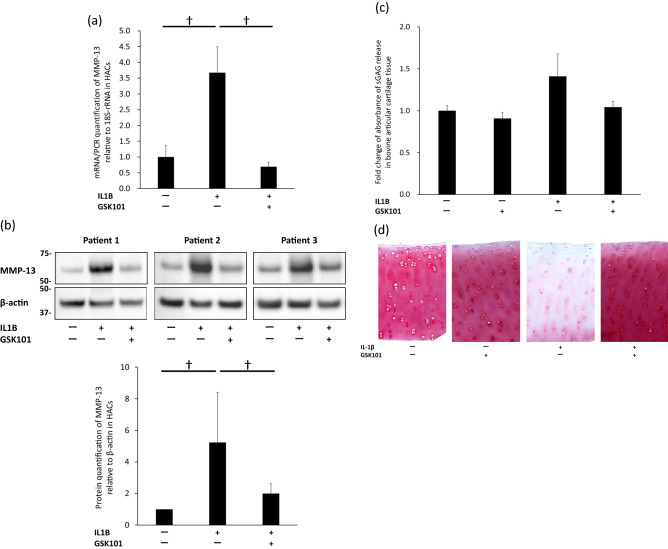Figure 2.
Reduction of IL-1β-induced cartilage damage by GSK101. (a) Real-time PCR of HAC lysates to examine the expression of MMP-13 after 12 h of treatment with 1000 pM GSK101, and (b) Western blot analysis of HAC lysates to examine the expression of MMP-13 after 48 h of treatment with 1000 pM GSK101. Experiments were repeated three times. Each group of the membrane associated with MMP-13 and the membrane associated with β-actin were different while their protein samples were the same. (a), (b) showed that GSK101 significantly reduced the expression of MMP-13 induced by IL-1β stimulation in HACs. Next, we performed DMMB assay on day 3 of explant culture and Safranin O/Fast Green staining on day 7 of explant culture of bovine articular cartilage tissue. Three replicates were used in each group. (c) In the DMMB assay, stimulating tissues with IL-1β significantly increased the elution of sGAG into the medium compared to the untreated control, while co-treatment with GSK101 significantly suppressed the IL-1β-induced release of sGAG. (d) In Safranin O/Fast Green staining of tissues after 7 days of IL-1β stimulation, similar tendency among three replicates was observed that substantial amounts of proteoglycans were lost from the explants and that these effects were almost completely rescued by co-treatment with GSK101. †p < 0.05 using one-way ANOVA with Tukey’s test. DMMB: dimethylmethylene blue; HAC: human articular cell; sGAG: sulfated glycosaminoglycan.

